In the wake of the COVID-19 pandemic, for those of us in the Local SEO world, one thing is clearer than ever: if you want your business to make an impact in your community, a strong local online presence is an absolute must. In addition to maintaining a complete and accurate Google Business Profile, user interaction — like getting ratings and generating reviews from your active customers — are a key component of any solid Local SEO strategy.
But do ratings and reviews really impact your local SEO? And if so, how?
Our 2021 Local SEO Rankings Study examined exactly that. To find out, we studied 5,624 business-oriented keywords, and analyzed the Local Pack results in Google Maps and the Local Pack on Desktop and Mobile.
How Reviews & Ratings Impact Local SEO for Google Maps
For listings on Google Maps, our local rank trackers found that the average number of reviews for a listing had a significantly stronger impact on its performance, compared to average rating. In fact, we found that average rating did not correlate with placement for the first three positions.
Here is the average rating breakdown for all the listings we analyzed across all categories:
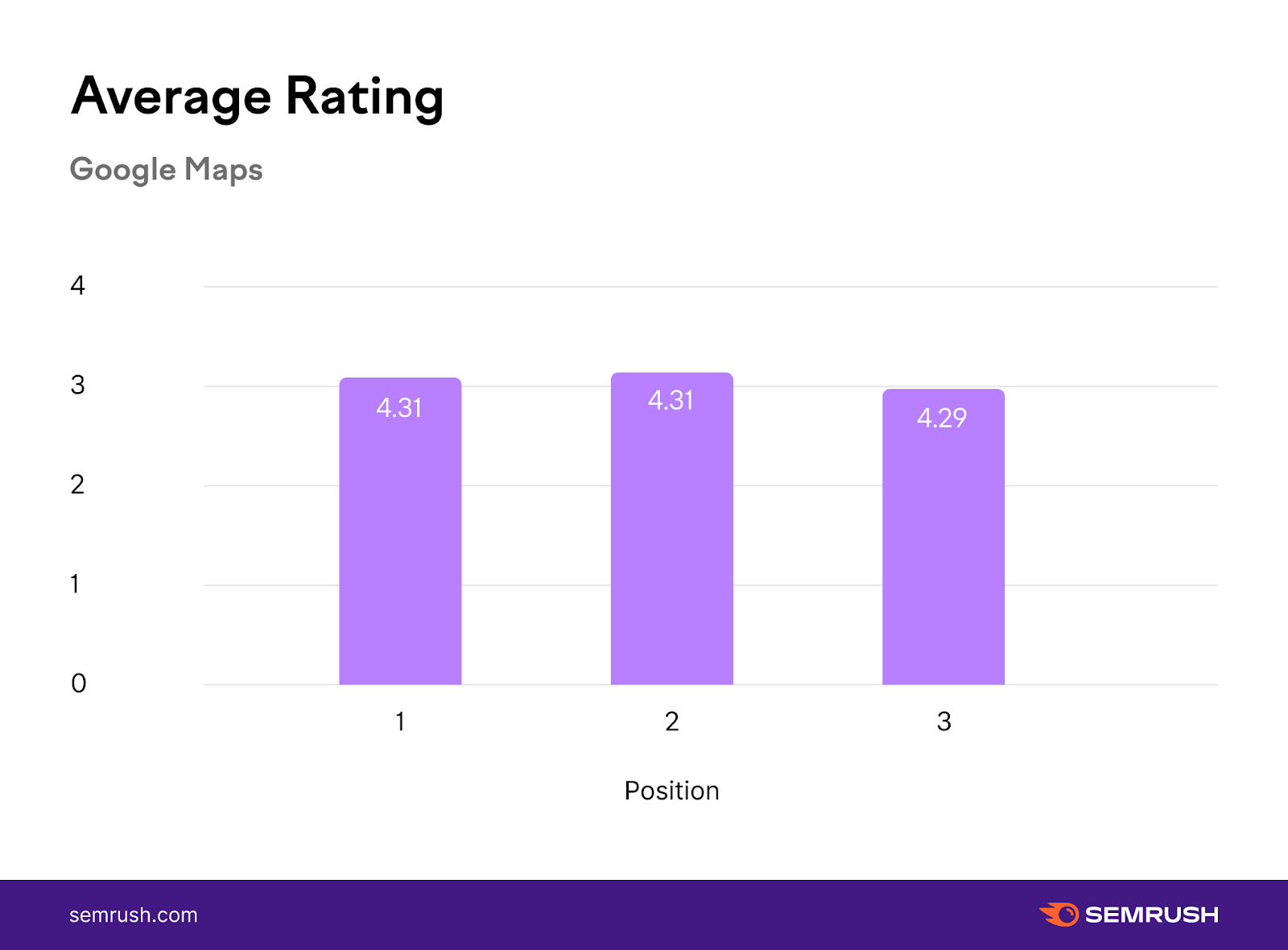
It’s important to note that all three positions have average ratings over 4.1, which tells us positive ratings are still beneficial, even if this does not ultimately determine whether you win the first position on Google Maps.
Conversely, the number of reviews a listing did correlate with its position.
Here is the average number of reviews the top three positions for all the listings we examined:
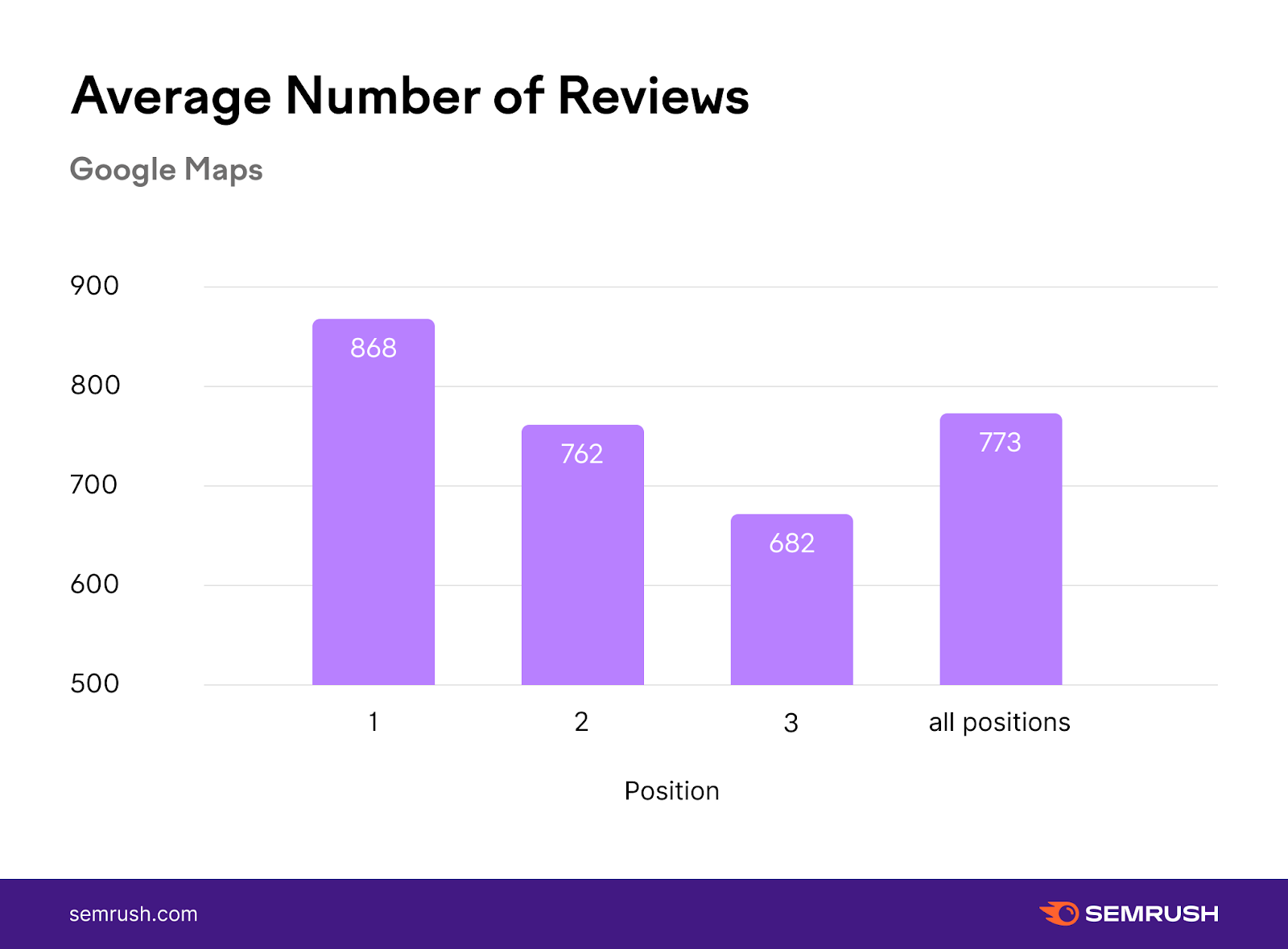
Notice how, on average, the top position had more reviews than those in positions two and three. The result was the same when we looked at the median number of reviews:
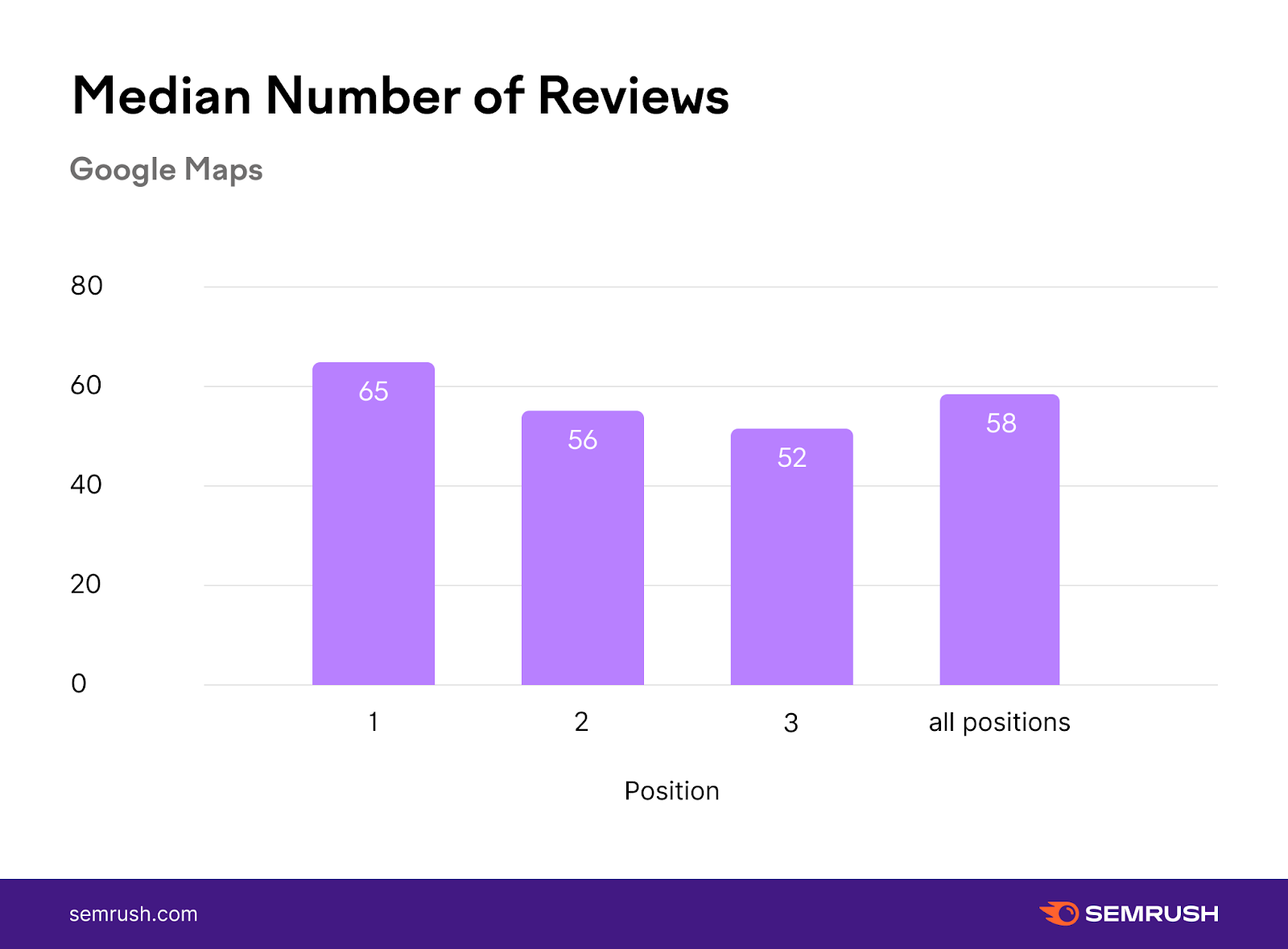
These results show us how important it is to encourage as many satisfied customers to review as possible. Together with a strong Google Business Profile, maintaining a high volume of reviews and an average rating of 4.1 or higher can help to improve visibility in Google Maps results.
Distance
While reviews and ratings are important, there’s no denying that distance plays a crucial role in Local SEO. According to Google, the three main ranking factors for a Google Business Profile are relevance, prominence, and distance.
In our study, we tested this, using the Empire State Building as our starting location. We found that approximately 72% of listings that ranked were within two mile radius. An additional 20% ranked between 2 and 10 miles away, and approximately 6% were between 10 and 50 miles away. (There were some interesting outliers, too, including one that ranked from a staggering 400 miles away!)

We also looked at the median distance by category, and found that users were willing to travel significantly farther for some types of businesses (such as Automotive, at a median of 3.1 miles) than others (like Beauty and Fitness at only 0.3 miles).

How Reviews Impact Your Local Pack Rankings on Desktop
Compared to our Google Maps findings, the impact of ratings and reviews on Local Pack performance on desktop was a little less clear-cut. That said, we can still conclude that the number of reviews for a listing has a stronger impact on its performance, compared to average rating.
As with Google Maps, the average rating for the top three positions in the Local Pack on desktop did not align with position. The second position had the highest average rating, though all three were once again above 4.1.

On desktop, the average number of reviews for businesses in the local pack did not correlate with their positions. In fact, listings in the second position had the lowest average number of reviews, despite also having the highest average rating.
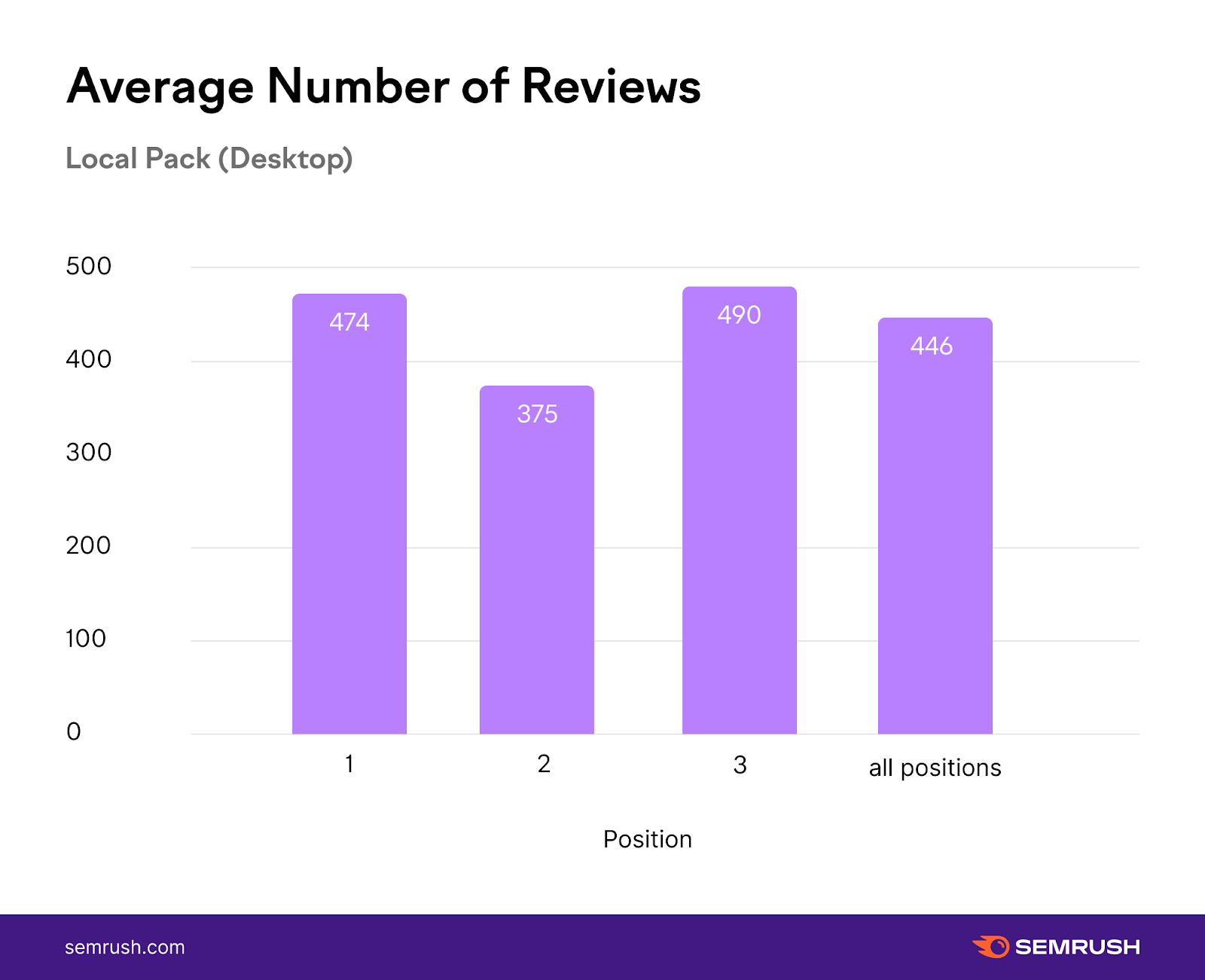
This was not the case with the median number of reviews. Instead, the median number of reviews corresponds neatly to position, with listings in first place having the highest median number of reviews, followed by second and third.
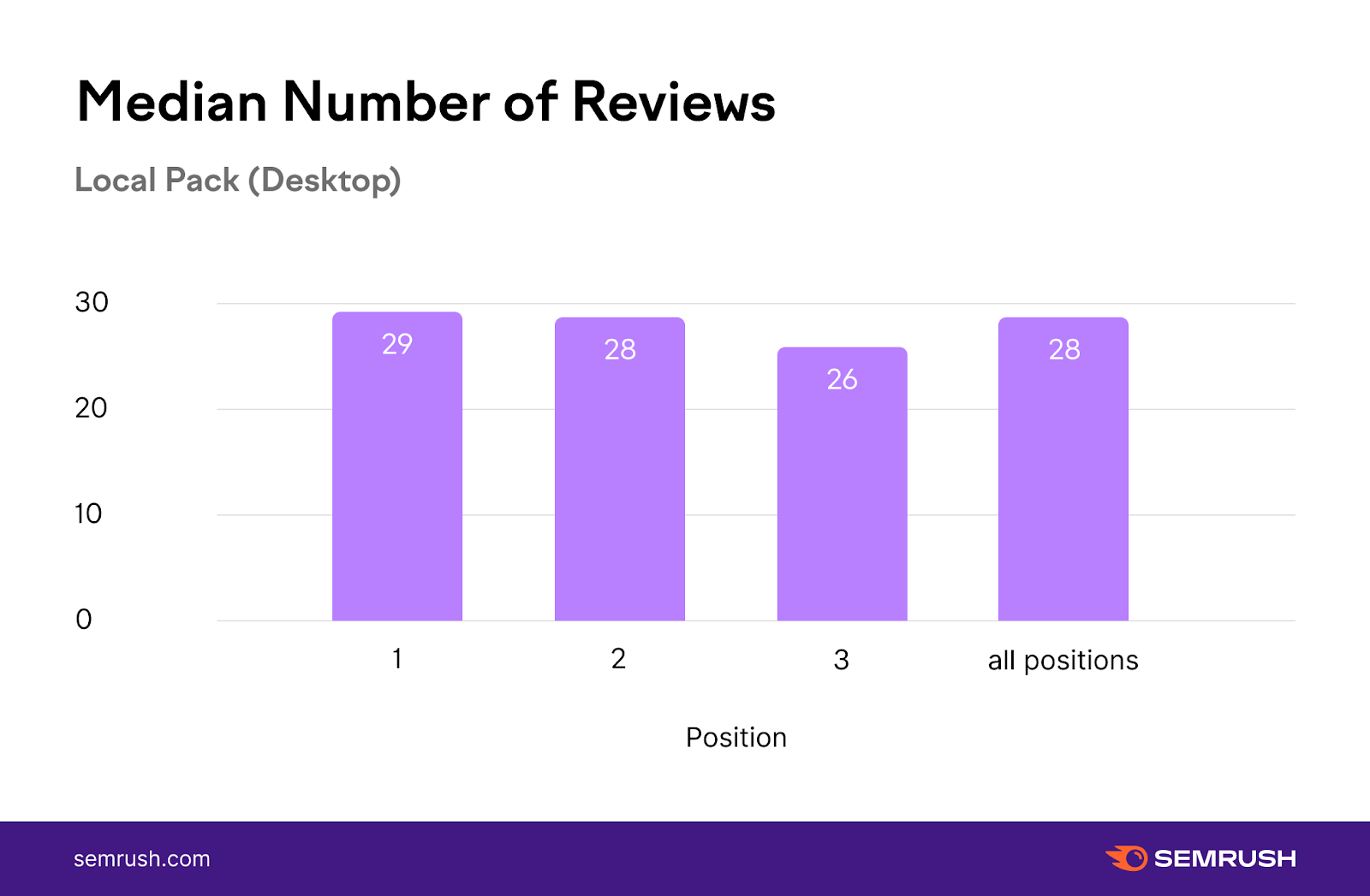
So why the difference? The main contributing factor here is the existence of outliers. Certain categories (notably, food and dining) generate far more reviews than others. This creates outliers that can skew the data. For these situations, the median is a little more reliable.
Based on the median number of reviews, we can infer that the number of reviews does in fact have an impact on your Local Pack performance on desktop, especially if your average rating is above 4.1.
Review Analysis
We also analyzed the review justifications that are featured in the Local Pack results.
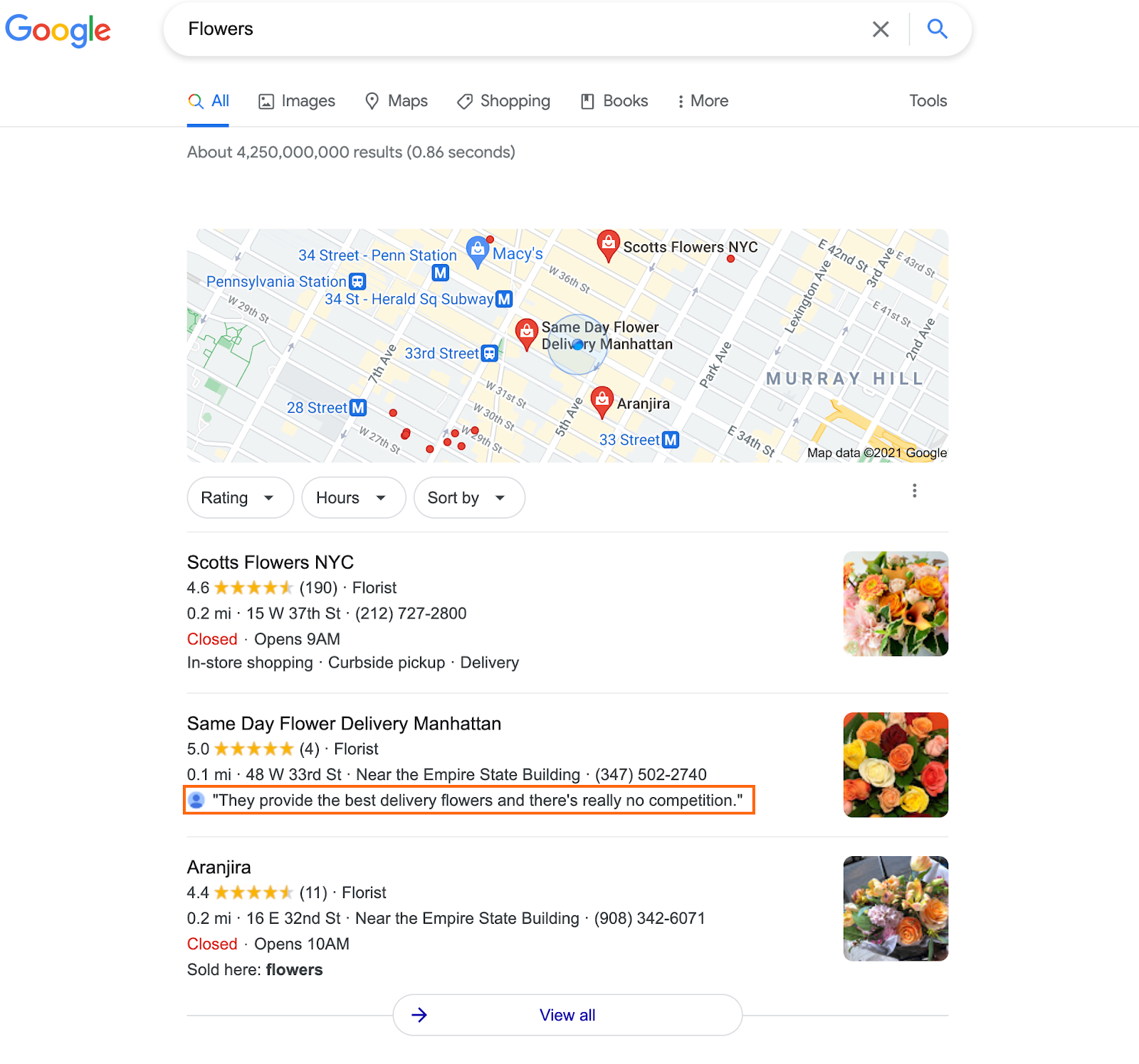
Of these, the majority were neutral in tone (at 60%), meaning they described the nature of their experience without any particular sentiment. For example, they might have described the type of establishment they visited, the type of food served, etc. without commenting on the quality of their service.
Only 2% of analyzed quotes were negative. That means the majority of visible review justifications described a positive or acceptable experience with that local business.

The remaining 38% of analyzed quotes were positive, meaning they used adjectives like great, best, nice, excellent, or professional to describe their experience.
Below is a breakdown of the most popular adjectives used in the reviews we analyzed:

Based on these findings, we can infer that customers are more likely to leave a review based on positive experiences, rather than negative ones. Given that approximately 91% of people read reviews, and 84% trust them as much as a friend’s personal recommendation, encouraging your happy customers to leave reviews could have a distinct positive impact, not only on your visibility, but also potentially on conversion.
Pro tip: Learn how to delete a Google review – while negative reviews cannot be removed, false ones can be flagged, according to Google’s User Contributed Content Policy.
Distance
When we analyzed the impact of distance on Local Pack desktop results, we saw very similar results to Google Maps. 70% of results ranked within a 2 mile radius, 22% ranked between 2 and 10 miles away, and an additional 6% ranked between 10 and 50 miles from our location. (Another similarity: our biggest outlier was more than 300 miles away, in Canada.)

When we broke down median distance by category, we found, once again, that users were willing to travel much farther for some categories (notably, Automotive again) than others.

Analyzing the Results
When we compared our desktop Local Pack results with Google Maps, approximately 70% of listings appeared in the top 3 positions on both platforms, though not necessarily in the same spot. When we accounted for both presence and position on both platforms, approximately 54% of the results were the same. Considering that ranking can fluctuate based on so many factors, we found this level of similarity to be notable.
How Reviews Affect Your Local Pack Ranking on Mobile
Just like with Google Maps and the Local Pack on desktop, average rating was not indicative of position in the Local Pack on mobile. While there was almost no difference between each position’s average rating, position two was once again the highest, despite having the lowest average number of reviews.
Additionally, all three positions again held average ratings above 4.1.

As noted above, because certain categories receive significantly more reviews than others, the median number of reviews is the more reliable figure. For mobile Local Pack, the median number of reviews for all the listings we analyzed decreased according to position, so that position one held the highest median number, followed by two and three respectively.
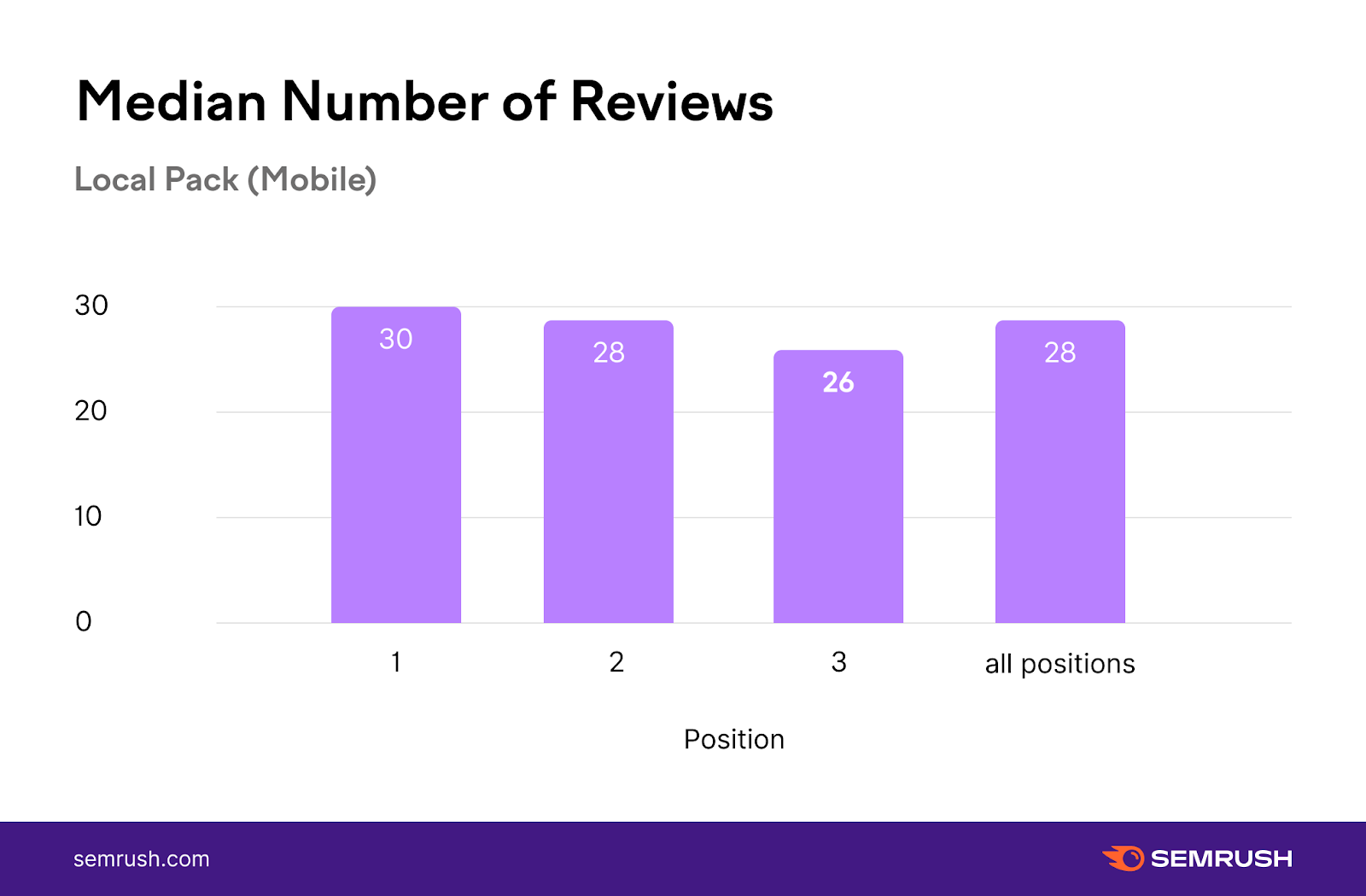
This is consistent with our findings on desktop and in Google Maps. When viewing the Local Pack on mobile, provided that a business’s average rating is strong (preferably above 4.1), number of reviews is a more influential factor in determining its placement in the results.
Review Analysis
About 65% of the time, the visible quotes from review justifications featured in the Local Pack on mobile are the same ones that appear on desktop. As a result, the trends are quite similar.
Once again, a strong majority (60%) were neutral in tone, meaning that they described an experience without using either positive or negative language. 38.5% were positive, while only 1.5% were negative.

The most popular adjectives used in these quotes were also similar to the desktop version. The majority of reviews appearing on mobile were positive in tone, using words like great, best, good, excellent, and professional.

Because there is not a significant difference between the review quotes that appear on mobile and desktop, the same strategy you use to encourage satisfied customers to leave reviews should benefit both platforms.
Distance
As with desktop, the distance breakdown for the Local Pack on mobile aligns closely with Google Maps. Once again, 70% of results ranked within 2 miles of our location, with an additional 22% between 2 and 10 miles away, and 6% between 10 and 50 miles away.

Similar to our Local Pack Desktop and Google Maps findings, when we broke down the median distance by category, we found that the Automotive category ranked from significantly farther away. On mobile, their median distance was 3.6 miles, while the closest runner-up, Sports and Recreation, had a median of 1.7 miles. Once again, Beauty and Fitness had the narrowest median distance at 0.3 miles.

Analyzing the Results
As with the desktop Local Pack, we found notable similarities between the Local Pack on mobile and Google Maps. Approximately 69% of listings in the top 3 positions appeared on both platforms, though not necessarily in the same position. Meanwhile, approximately 52% of listings appeared in the same position on both platforms.
However, results in the Local Pack on mobile and desktop were not identical. Approximately 77% of listings appeared on both mobile and desktop, regardless of position. When we considered both presence and position, that figure dropped to approximately 68%.
What You Can Do About It
Encouraging your customers to review is always not an easy task. There might be as many strategies out there to accomplish this as there are businesses with online profiles. Step one, of course, is to ensure that as many customers as possible walk away with a positive experience.
You can help those satisfied customers leave more impactful reviews by providing them with links to your Google listing, along with starter questions, which can make it easier for reviewers to compose their reviews, while also subtly encouraging them to use the keywords you want to target. (You can find more tips in this blog post on Local SEO tactics)
As part of your online review management, it’s also crucial that you monitor your online reviews and respond appropriately wherever possible. You can use the Reviews report in Listing Management tool to monitor the reviews for each of your business’s location, your average rating, and even respond, all without leaving the page.

Of course, one of the best ways to stay on top is to arm yourself with knowledge and use local SEO services to help you with the process. Want to learn more about how to conquer the Local Pack and Google Maps? Don’t miss the Local SEO Rankings ebook, coming soon!
